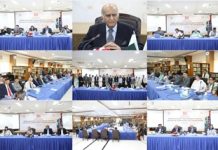Individual deals with the regime will weaken the democratic struggle. The collective political weight of all the political parties and civil society behind a consensus on the 1973 Constitution can help us make a successful transition to democracy
Political alliances, coalition building and power sharing are normal in democratic processes. In fragmented and polarised political communities, coalitions are the only way to stabilise a political order. One of the most important social functions of democracy is that it promotes harmony, helps mediate conflicts of interest and recognises the legitimacy of pursuing one’s own interests, pleasures and purposes in personal and collective life. But all this happens within the larger framework of fundamental rules of the game, under the Constitution and in an open space.
Let me also clarify that politics are not about the pursuit of transcendental, self-denying goals. But they should pursue the morality and legalism of a Constitution that spells out how to acquire power, and for what purposes and under what conditions to quit or be forced out.
This kind of moral politics is possible only when a society and its people are blessed with democracy and supremacy of the Constitution. In the absence of the two, another kind of politics is practised, which we have witnessed quite often in our own country: the politics of intrigue, secret deals that take place behind the scene in drawing rooms or remote locations. Their interlocutors are often trusted men and women having the good will of their parties and a mandate to close a deal.
What promotes the politics of deals? Obviously, they happen under authoritarian regimes, but in societies that have some tradition of political openness but also have fractured political systems and divided party loyalties. Our political pathology for the past three decades, since the overthrow of Zulfikar Ali Bhutto in 1977, has glaringly manifested a mixed syndrome of relative openness, praetorian rule and political fragmentation.
One of the most dominant features of military rules in Pakistan has been the taking on board of a large section of the country’s political elite. They have offered themselves readily to the putting up of a political façade through party-less elections or by giving a prefix or suffix to the Muslim League.
Why would a mighty general with an army under his command, Constitution in suspension, new superior judiciary sworn in under a provisional constitutional order and civilian bureaucracy helpless and sheepishly following it, seek political cooperation from “likeminded” members of the political class?
He might need effective political players to match the wit, power and popularity of those opposed to military rule. Secondly, despite their coercive power and relative inhibition in using it, military regimes are vulnerable to multiple political threats, like armed resistance, popular uprisings led by charismatic leaders and alienation of populations.
A political façade is necessary for the military regime to create a constituency of support, induce a degree of optimism and reach out to ordinary people through political intermediaries. Such politics have, over time, stunted the growth of democracy and constitutionalism.
General Pervez Musharraf and his political associates have shown remarkable deftness in making alliances with so many diverse elements, from religious to ethnic parties and caste-oriented sub-political groups. There is a growing body of information that the General may be changing the horses that pull his political cart. He may not discard them altogether, but would like them to play second fiddle if he succeeds in clenching a deal with the PPP, or more precisely, Benazir Bhutto.
Who would benefit more from this deal, if anyone or any group does? Let us first count those who would lose the most. First in the line of losers will be democracy and constitutionalism, as the new political union or partnership will keep Musharraf in power and further erode consensual politics by fragmenting opposition parties, particularly the Alliance for the Restoration of Democracy.
Mohtarma Benazir Bhutto would perhaps be more concerned about a deal’s immediate and visible material gains for herself and her spouse in exchange for support to Musharraf for his election through the present or future assemblies. These gains could be escape from accountability, power in Sindh and a bigger share in the Punjab and centre. Some form of official support to PPP candidates to create a ‘levelled’ electoral field might be part of the deal.
Benazir Bhutto and/or her party, if they join hands with Musharraf, would change the dynamics of Pakistani politics in a crucial year when fundamental constitutional issues and the role of the General in Pakistani politics will be determined. In the long-term, and not-so-long-term, Bhutto’s party, seen as aligned with the military-led regime, will suffer grave political consequences, including disintegration of its mass base.
The People’s Party started with populism and mass mobilisation but soon after its founder got into power, turned to the old-fashioned politics of alliances with landed elites, leaving the real vanguard of its success, the middleclass progressive intellectuals, working class and students, high and dry. That drift to the right has continued with Benazir Bhutto’s two stints in power. Numbers in the assemblies and power have mattered more than principles and ideology to a party that gave such things a distinctive identity in Pakistani politics. That is no longer true about its leadership or its style of politics.
Despite many political wrongs committed by PPP leaders and injuries inflicted on it by its political adversaries, it can still claim having a solid constituency. Its social support base has weakened but still appears to be more impressive than any mainstream party’s in the country. Getting power and relief from accountability cases through drawing-room conspiracy, without fighting a legal battle and coming out clean would, in my view, be a recipe for political disaster for the PPP. It has already become an elite club with a smattering of middleclass sycophants.
The party that has the popular legacy and great sacrifice of Zulfikar Ali Bhutto in its blood stream can be expected to make a choice for democracy and constitutionalism. It did the right thing to go with the ruling party and its political rival in 1997, passing the 13th Amendment. It did still better in signing the Charter of Democracy with Muslim League (N) last year. That may be the starting point of a common democratic struggle for the restoration of democracy.
With the ongoing judicial crisis and the legal community’s struggle for rule of law, independence and dignity of judiciary, Pakistan is passing through yet another critical moment of its political history. The choices that major political parties make will have a great impact on the crisis itself as well as on politics in the coming years. Individual deals with the regime will weaken the democratic struggle. The collective political weight of all the political parties and civil society behind a consensus on the 1973 Constitution can help us make a successful transition to democracy.
The author is a professor of Political Science at the Lahore University of Management Sciences.












